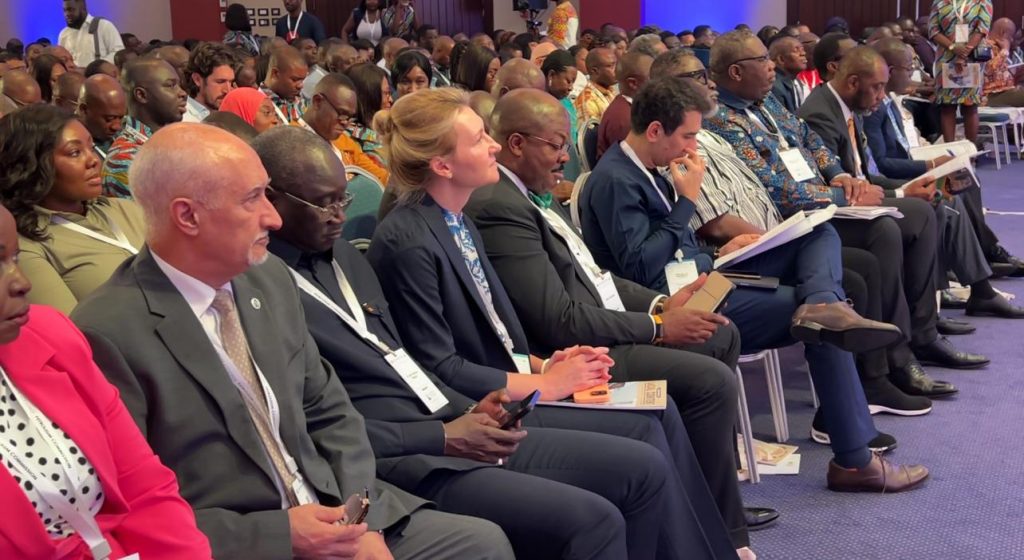By Mildred Siabi-Mensah
Takoradi, Nov. 22, GNA -Mr. Egbert Faibille Jnr, the Chief Executive Officer of the Petroleum Commission says the Commission will not relent in its efforts to ensure full compliance with the local content laws.
Accordingly, when the Petroleum Commission sets out to insist on local content, it is not on any other terms but what is provided for by the law “as partial compliance is no compliance,”.
The Regulation 49 of L.I. 2204 defines “local content” as “…the quantum of percentage of locally produced materials, personnel, financing, goods and services rendered in the petroleum industry value chain, and which can be measured in monetary terms.”
Mr. Faibille Jnr said this at the opening of the 2023 Local Content Conference and Exhibition under the theme “10 years of Local Content in Ghana’s Upstream Petroleum Industry: Achievements, Challenges and Prospects”.
The conference is aimed at promoting local content and local participation in accordance with Legislative Instrument (L.I) 2204.
The PC Boss was not happy that some companies were operating beneath the requirements, “regrettably, some companies operating in our upstream environment have sought to operate beneath the obligation to do local content as enshrined in the law.”
” We applaud such investors and commit to working closely with you by supporting your businesses.”
The Commission, he said, had also resolved to ensure that all matters proven to be anathema to enhanced Exploration and Production activities were confronted head-on.
He said the Commission, had put together a paper on how Ghana could ensure that seismic and other petroleum data were made available for the use of investors for enhanced E&P activities.
Ghana, he noted, presently had six blocks that needed investments revealing that three, namely, the Offshore Cape Three Points South Block, the Shallow Water Cape Three Points Block and the Southwest Saltpond Block were available for investments by way of direct negotiations with the Minister for Energy.
An additional three blocks were available for farm-ins. These are the Deep-Water Cape Three Points Block which is operated by GOIL Upstream, the Expanded Shallow Water Tano Block, which is operated by Base Energy and the Offshore South West Tano Block.
Mr Faibille Jnr said the impressive growth of local content levels in the petroleum industry had not been without challenges with some uncharted waters in the industry which called for all industry players to discuss prospects of local content development.
Over the last 10 years, the upstream petroleum businesses had improved significantly since L.I. 2204 entered into force.
In 2021, contracts awarded to IGCs surged from approximately US$7 Million in 2020 to approximately US$14 Million in 2021 (200%).
There was a further leap on this figure to approximately US$157 Million (72 contracts) in 2022 representing an over 1000% growth, the PC Boss reported.
He said, contracts to joint ventures also witnessed significant growth over the period which grew by over 650% from approximately US$51 Million in 2020 to US$336 Million in 2022.
The Energy Minister, Dr. Matthew Opoku Prempeh, applauded the Local Content Conference and Exhibition (LCCE) as enormous success in Ghana’s quest to drive an efficient and inclusive local content policy for the upstream petroleum sector.
“This year’s event is yet another successful example of such collaboration. In our case as an emerging oil producer, we act as a team with companies operating in the sector. The exhibition has not lost its significance, but further increased its value and importance,” he said.
Dr. Prempeh said “Ghana’s commercial production of petroleum had covered a long road in 13 years. We were at the initial stage of the local content agenda with the first commercial production from Jubilee Field. Ghana has made great strides in the petroleum sector.
“This exhibition has been an extremely useful component in Government local content pursuit. It has proved important to the development of local content in Ghana’s upstream petroleum industry.”

The Local Content Policy, the Minister stated, was developed to promote the development of indigenous capabilities and the use of local capacities in the exploitation of our petroleum resources.
Further, the policy, Dr Prempeh added, ensured the passage of Local Content Regulations in 2013 to create a conducive environment for indigenous Ghanaian companies to succeed in the industry.
He said, 10 years of experience of local content policy showed Ghana could achieve immense success through cooperation, adding, “Only a balance of interests of all stakeholders can lead to success of all parties.”
For example, he said, in the first oil field development prior to the passage of the Local Content Regulations, only 6.5 percent of contracts were awarded to the Ghanaian companies but, a decade after the passage of the regulations, about 20 percent of value of contracts had been awarded to Ghanaian companies.
Dr. Prempeh said, the drive towards optimal local content successes was proud that, Springfield, a fully Indigenous Ghanaian Exploration and Production company drilled, successfully discovered in deep waters, the Afina-1X in 2019.
This feat is commendable and must be celebrated as the first of its kind in the history of our oil and gas industry, the minister said.
He continued “It also demonstrates the increasing capacity of Ghanaians to take charge of the exploitation of our hydrocarbon resources especially in the wake of the energy transition. It is this success among others that we are celebrating 10 years after the passage of our local content regulations.”
Again, Dr. Prempeh said, the concerted efforts of government and the Jubilee Partners resulted in addition of 30,000 barrels of oil per day to our production profile, adding the Eban and Akoma discoveries also contributed to the Ghana’s proven gas reserves and potentials.
He said, “The approval of the Pecan Field Plan of Development will also add to the stream of opportunities available to indigenous Ghanaian companies with expected in-country fabrication of over 3,000 tons of FPSO top side refurbishments, and subsea installations.”
GNA